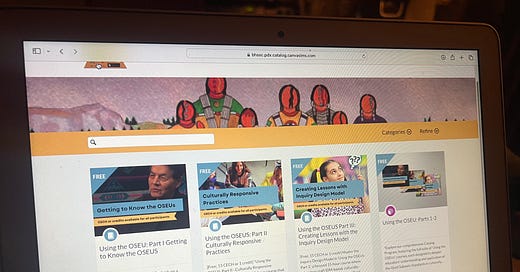State launches tool to help educators with Native learning standards
Office of Indian Education launches Oceti Sakowin standards training tool
The South Dakota Office of Indian Education Wednesday announced the launch of the Oceti Sakowin Essential Understandings and Standards (OSEUS) Online Training Course for educators across the state.
The course is intended to assist administrators and teachers in integrating the Oceti Sakowin Essential Understandings into their schools. It is available free of charge to educators, and is self-paced, allowing teachers to more easily fit it into their busy schedules.
The course contains three sections: “Getting to Know the OSEUS,” “Culturally Responsive Practices,” and “Creating Lessons with Inquiry Design Model.”
NEWS: Bipartisan meeting with Gov. Kristi Noem results in renewed commitment to tribes
“The goal of the OSEUS course is to spread cultural awareness and education about the Oceti Sakowin in all schools,” said Office of Indian Education Director Fred Osborn. “Our office is excited to provide educators an opportunity to learn about the OSEUS, and how to incorporate them into their classrooms.”
The first module is guided by indigenous elders from South Dakota, and explores the significance of the land, environment, identity, culture, language, oral traditions, sovereignty, and way of life of the Oceti Sakowin.
“Culturally Responsive Practices” guides teachers through understanding indigenous students’ backgrounds, and is intended to promote socio-cultural consciousness.
And “Creating Lessons with Inquiry Design Model” provides guidance to teachers on how to incorporate the courses’ teachings into lesson plans across grade levels.
The course also provides tips to administrators on how to create more cohesion and understanding of the lesson plans beyond just one classroom.
Right now, the course is only available to educators with a K12.sd.us email address.
Educators will be offered Continuing Education Credits or Graduate Credits upon completing the three-part course. The initiative is funded by the Wóokiye Project, a Bush Foundation grant project.















Not knowing what is in this course for educators, could it or something similar be offered to all South Dakotans? Wouldn’t we all benefit?